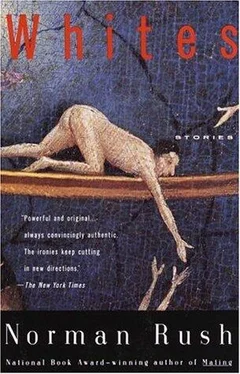PRAISE FOR NORMAN RUSH’S WHITES
“A haunting glimpse of individuals in the grip of passions and history.”
— Time
“ Whites … is a collection of six low-keyed yet forceful stories set in Botswana.… There is evidence in them of those who have gone before — Evelyn Waugh, Graham Greene, William Boyd.”
— Jonathan Yardley, Washington Post
“Superbly written … Rush … uncovers with grace, good humor and intelligence the sinuous complexities of the white man’s experience of Africa.… It’s the book’s sense of well-timed voyeurism that pleases — the sense of looking into the lives of individuals at precisely those moments where they reveal the most about themselves and about the culture that shaped them.”
— St. Petersburg Times
“Rush has a brilliant eye for landscape [and] is a master at plot.”
— Nation
“ Whites shows Rush at his astringent best — but even more, it represents one of those rare confluences of a particular witness, a historical moment, and an exotic locale that have created such earlier one-and-for-all copyrighted milieus as Isherwood’s Berlin or Maugham’s South Sea Islands. Norman Rush’s Botswana is as keenly seen, as memorably imagined.”
— Tom Disch
“A profound and splendid collection of stories about modern Africa that demands to be read slowly and regarded weightily … It is impossible to name favorites here; they are all brilliant, angry, careful, serenely wise stories.”
— John Calvin Batchelor
For Elsa, beautiful and good,
perfect friend, with gratitude
Poor Bruns. They hated him so much it was baroque. But then so is Keteng baroque, everything about it.
Probably the Boers were going to hate Bruns no matter what. Boers run Keteng. They’ve been up there for generations, since before the Protectorate. When independence came, it meant next to nothing to them. They ignored it. They’re all citizens of Botswana, but they are Boers underneath forever, really unregenerate. Also, in Keteng you’re very close to the border with South Africa. They still mostly use rands for money instead of pula. Boers slightly intrigue me. For a woman, I’m somewhat an elitist, and hierarchy always interests me. I admit these things. The Boers own everything in Keteng, including the chief. They wave him to the head of the queue for petrol, which he gets for free, naturally, just like the cane liquor they give him. They own the shops. Also they think they really know how to manage the Bakorwa, which actually they do. You have to realize that the Bakorwa have the reputation of being the most violent and petulant tribe in the country, which is about right. All the other tribes say so. And in fact the Boers do get along with them. In fact, the original whites in Keteng — that would be the Vissers, Du Toits, Pieterses … seven families altogether — were all rescued by the Bakorwa when their ox wagons broke down in the desert when they were trekking somewhere. They started out as bankrupts and now they own the place. It’s so feudal up there you cannot conceive. That is, it has been until now.
I know a lot about Keteng. I got interested in Keteng out of boredom with my project. Actually, my project collapsed. My thesis adviser at Stanford talked me into my topic anyway, so it wasn’t all that unbearable when it flopped. At certain moments I can even get a certain vicious satisfaction out of it. Frankly, the problem is partly too many anthropologists in one small area. We are thick on the ground. And actually we hate each other. The problem is that people are contaminating one another’s research, so hatred is structural and I don’t need to apologize. At any rate, I was getting zero. I was supposed to be showing a relationship between diet and fertility among the Bakorwa up near Tswapong, in the hills. The theory was that fertility would show some seasonality because the diet in the deep bush was supposedly ninety per cent hunting-gathering, which would mean sharp seasonal changes in diet content. But the sad fact is you go into the middle of nowhere and people are eating Simba chips and cornflakes and drinking Castle lager. The problem is Americans, partly. Take the hartebeest domestication project, where they give away so much food and scraps and things that you have a kind of permanent beggar settlement outside the gate. And just to mention the other research people you have encumbering the ground — you have me, you have the anthropologists from the stupid Migration Study and the census, and you have people from some land-grant college someplace following baboons around. By the way, there were several baboon attacks on Bakorwa gathering firewood around Keteng, which they blame on the Americans for pestering the baboons. Or Imiricans, as the Boers would say. America gets the blame.
The other thing is that Keteng is remote. It’s five hours from the rail line, over unspeakable roads, through broiling-hot empty thornveld. In one place there’s no road and you just creep over red granite swells for a kilometer, following a little line of rocks. So the Boers got used to doing what they wanted, black government or not. They still pay their farm labor in sugar and salt and permission to crawl underneath their cows and suck fresh milk. It is baroque. So I got interested in Keteng and started weekending. At my project site, camping was getting uncomfortable, I should mention, with strange figures hanging around my perimeter. Nobody did anything, but it makes you nervous. In Keteng I can always get a room from the sisters at the mission hospital and a bath instead of washing my armpits under my shirt because you never know who’s watching.
The place I stay when I descend into Keteng is interesting and is one reason I keep going back. I can see everything from the room the sisters give me. The hospital is up on the side of a hill, and the sisters’ hostel is higher than that, on the very top. My room is right under the roof, the second story, where there’s a water tank and therefore a perpetual sound of water gurgling down through pipes, a sound you get famished for in a place so arid. Also, in tubs on the roof they have vines growing that drape down over the face of the building, so you have this green-curtain effect over your window. The sisters have a little tiny enclosed locked-up courtyard where they hang their underthings to dry, which is supposed to be secret and sacrosanct, which you can see into from my room. You can also see where Bruns stayed — a pathetic bare little shack near the hospital with gravel around the stoop and a camp stool so he could sit in the sun and watch his carrots wither. At the foot of the hill the one street in Keteng begins at the hospital gate and runs straight to the chief’s court at the other end of town. Downtown amounts to a dozen one-story buildings — shops — with big houses behind them. You can see the Bakorwa wards spreading away from the center of Keteng — log kraals, mud rondavels with thatch, mostly, although cement-block square houses with sheet-metal roofs held down by cobbles are infiltrating the scene. Sometimes I think anthropology should be considered a form of voyeurism rather than a science, with all the probing into reproductive life and so forth we do. I’m voyeuristic. I like to pull my bed up to the window and lie there naked, studying Keteng. Not that the street life is so exotic. Mostly it’s goats and cattle. I did once see a guy frying a piece of meat on a shovel. The nuns have really hard beds, which I happen to prefer.
Poor Bruns. The first thing I ever heard about him was that there was somebody new in Keteng who was making people as nervous as poultry, as they put it.
Читать дальше












